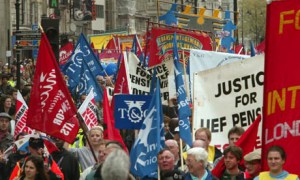Trade Unionists: we need “our own coalition”
Article published: Monday, September 20th 2010
Last week 200 people attended a Trade Union Congress (TUC) fringe event on the need to fight for public services. Manchester Trades Council hosted the meeting, which was addressed by the general secretaries of four major unions. Ben Egan reports for MULE.
All speakers—from the floor as well as the panel—were in agreement as they recounted their various experiences: public sector workers did not cause the crisis, so they should not pay for it.
Christine Blower of the National Union of Teachers (NUT) called on all union members to get “seriously involved”, encouraging co-ordinated industrial action to halt the threat of many young workers slipping into a “jobless generation”. Using the defence of public sector pensions as an example of effective co-operation she said, “The last time they came for our members’ pensions a co-ordinated ballot was enough. The government backed down.”
Teaching is one of the most competitive market for UK trade unions. All three major unions in compulsory state education have recognition for national bargaining and as a result subscriptions are relatively low and resources stretched. This often leads to frayed relations, making the joint campaign they launched against the academies programme over the summer all the more refreshing.
Blower went on to claim that the policies of the new government are bringing unions together: “In June Michael Gove announced that there would be 1,100 academies opening in September. In fact there were only 32 – what [TUC General Secretary] Brendan Barber called a ‘feeble dribble’. Imagine what we could do with co-ordinated campaigning across the public sector.”
Billy Hayes of the Communication Workers’ Union (CWU) highlighted the importance of building “our own coalition” with people and organisations outside of the trade union movement. “It’s not enough just to say it”, he warned. “We have to map an alternative economic strategy.”
He went on to highlight CWU research showing that 51 per cent of Conservative voters and 63 per cent of Liberal Democrat voters are opposed to the privatisation of the Royal Mail (which he described as “like Groundhog Day”). The union has consequently identified over 70 coalition MPs who are vulnerable, with less than 10 per cent majorities, to political pressure.
Before Congress started Mark Serwotka of the Public and Commercial Services Union (PCS) stole many of the headlines with uncompromising comments on the need for action. Addressing this meeting he was unrepentant, stressing that “an onslaught on the public sector on this scale is unprecedented. So the campaign of resistance must also be”. Uniting disparate players was also key to the campaign: “We have to unite the providers of public services with the users…The Right are already trying to play people against one another—the public versus the private, workers versus the unemployed—and it’s important we all resist that”.
The PCS leader has in recent years cemented his place as one of the new breed of so-called ‘Awkward Squad’ unionists. There was certainly some unease in the room when he broke from the script to call for “not one penny in cuts. We need to be clear about this and stand up against this unnecessary ideological assault on working people”.
Controversial, certainly, but most people applauded – eventually. And in Serwotka’s defence he offered statistical evidence to back his stance contesting the supposed imperative of deficit reduction: “Between 1918 and 1941 the UK national debt was more than double what it is now as a percentage of GDP. It is 52 per cent now but was over 100 then. And in that time we built the NHS and the modern welfare state.”
Matt Wrack of the Fire Brigade’s Union (FBU) also backed the call for co-ordinated action and launched a scathing attack on “the endless mantra of free market reforms that have thrown tens of thousands of workers onto the scrapheap across Europe.”
The theme repeated was that times (and opinions) are changing quickly and capturing public support is essential. The Branch Secretary of Kirklees Unison noted that ballots for action that would have been lost as recently as July are now easily winnable.
Perhaps the most telling contribution all evening came from Tommy Walsh, Unite retired member who sits on the TUC Retired Members’ Forum. He warned how public opinion was fickle and the most important thing was to constantly challenge representations in the media. 78 year-old Walsh described how he remembered as a teenager the press reports whipping up fear over the deluge of scroungers that would abuse a National Health Service if one was established.
“If there’d been a referendum on the NHS in 1948”, he said, “it would have been lost”.
Ben Egan
More: Manchester
Comments
No comments found
The comments are closed.




